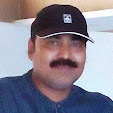



There has been a few instances of widespread public support to mass movements or Satyagrah in Independent India as that of 'Fast unto Death' begun by Anna Hazare today at Jantar Mantar, New Delhi. I too went there with few of my colleagues and registered my support for the cause, the importance and genuineness of which I am convinced.
Anna Hazare has begun fast unto death demanding enactment of a strong Anti Corruption Law called "Jan Lokpal Bill" from today.
The pamphlet distributed said that " Last time when Anna sat on fast -
*6 Corrupt Ministers in Maharashtra had to resign;*400 corrupt officers were dismissed from job;*2002 - Maharashtra RTI Act was passed;*2006 - Central Government withdrew its proposal to amend RTI Act.
Now Anna is fasting to demand Jan Lokpal Bill. At 78, Anna is not fasting for himself, he is fasting for the future of our children.
To stay updated about this movement, please send us a missed call at 02261550789."
Dr.Kisan Baburao Hazare, popularly known as Anna Hazare (b. June 15, 1938), is an Indian social activist who is especially recognized for his contribution to the development of Ralegan Siddhi, a village in Ahmednagar district, Maharashtra, India and his efforts for establishing it as a model village, for which he was awarded the Padma Bhushan by Govt. of India, in 1992.
His tryst with the army came when many Indian soldiers became martyrs in the Indo-China War of 1962 and the Government of India had appealed to young Indians to join the Indian army. Being passionate about patriotism, he promptly responded to the appeal and joined the Indian Army in 1963. During his 15-year tenure as a soldier, he was posted to several states like Sikkim, Bhutan, Jammu-Kashmir, Assam, Mizoram, Leh and Ladakh and braved challenging weathers.
At times, Hazare used to be frustrated with life and wondered about the very existence of human life. His mind yearned to look out for a solution to this simple and basic question. His frustration reached the peak level and at one particular moment, he also contemplated suicide. For this, he had also penned a two page essay on why he wants to live no more. Fortunately for him, inspiration came from the most unexpected quarters ?at the book stall of the railway station of New Delhi, where he was located then. He came across a book of Swami Vivekananda and immediately bought it.
He was inspired by Vivekananda’s photograph on the cover. As he started reading the book, he found answers to all his questions, he says. The book revealed to him that the ultimate motive of human life should be service to humanity. Striving for the betterment of common people is equivalent to offering a prayer to the God, he realized.
In the year 1965, Pakistan attacked India and at that time, Hazare was posted at the Khemkaran border. On November 12, 1965, Pakistan launched air attacks on Indian base and all of Hazare’s comrades became martyrs, It was a close shave for Hazare as one bullet had passed by his head. Hazare believes this was the turning point of his life as it meant he had a purpose to life. Anna was greatly influenced by Swami Vivekananda’s teachings. It was at that particular moment that Hazare took an oath to dedicate his life in the service of humanity, at the age of 26. He decided not not to let go of a life time by being involved merely in earning the daily bread for the family. That’s the reason why he pledged to be a bachelor. By then he had completed only three years in the army and so would not be eligible for the pension scheme. In order to be self-sufficient, he continued to be in the army for 12 more years. After that, he opted for voluntary retirement and returned to his native place in Ralegan Siddhi, in the Parner tehsil of Ahmednagar district.
While in the army, Hazare used to visit Ralegan Siddhi for two months every year and used to see the miserable condition of farmers due to water scarcity. Ralegan Siddhi falls in the drought-prone area with a mere 400 to 500 mm of annual rainfall. There were no weirs to retain rainwater. During the month of April and May, water tankers were the only means of drinking water. Almost 80 per cent of the villagers were dependent on other villages for food grains. Residents used to walk for more than four to six kilometers in search of work and some of them had opted to open country liquor dens as a source of income.
More than 30-35 such dens located in and around the village had tarnished the dignity of the village and marred the social peace. Small scuffles, thefts and physical brawls resulted in loss of civic sense. Morality had reached such a nadir that some of the residents stole wooden logs of the temple of the village deity Yadavbaba to burn the choolah of one of the country liquor outfits.
I witnessed the conglomeration of entire Media, and support of people from different shades of socio-political set up. I remembered doubt of some of my friends who contribute widely to discussions especially in Net dialogues / monologues. However, it is my firm belief that while combating the termite of today's socio-political disorder eating away into the prosperity of India and Indians, support coming from different quarters are welcome, but it is also a a hard fact that only a mass movement can bring about meaningful difference as the kind that occurred in 1977 the Janta Rising (JP) or 1990 also the Janta Rising (VP)!
So, remember what Swami Vivekanand had to say, " Arise, awake and stop not till the goal is achieved." This is for those who also support this cause.

No comments:
Post a Comment